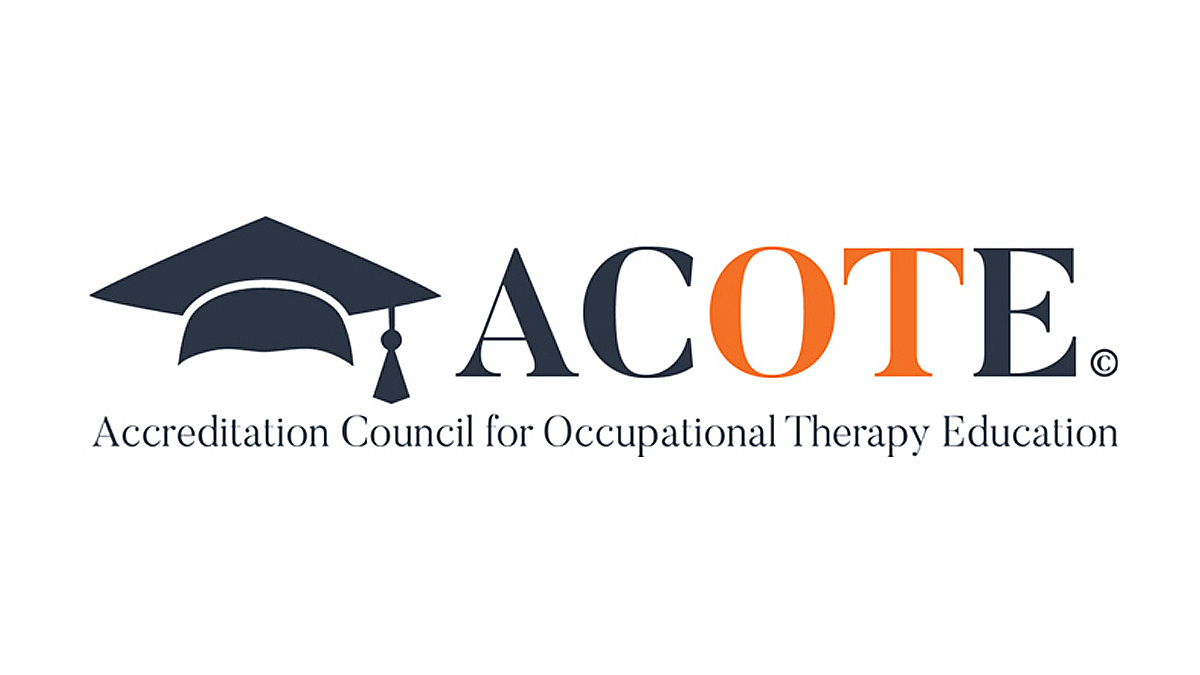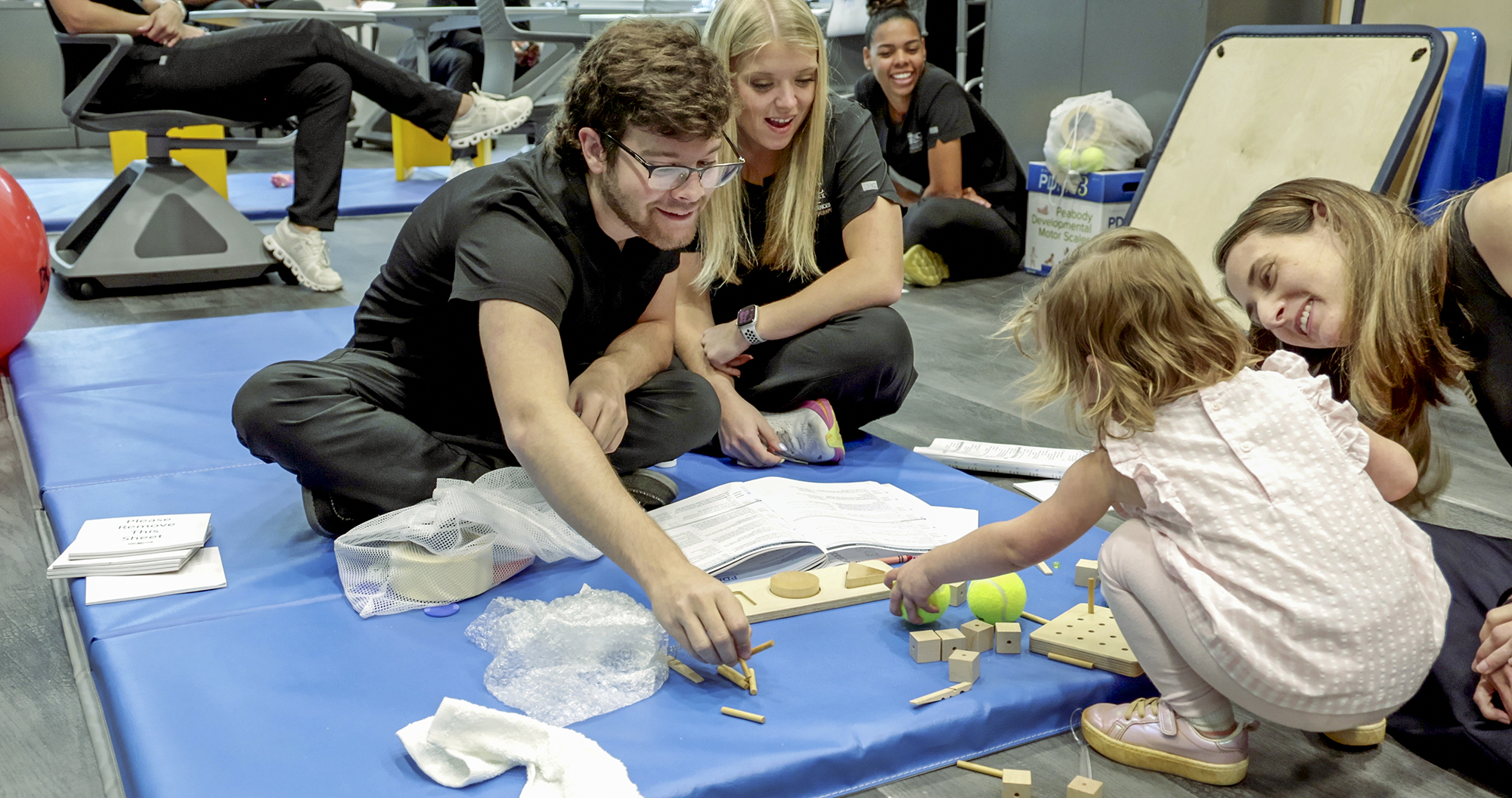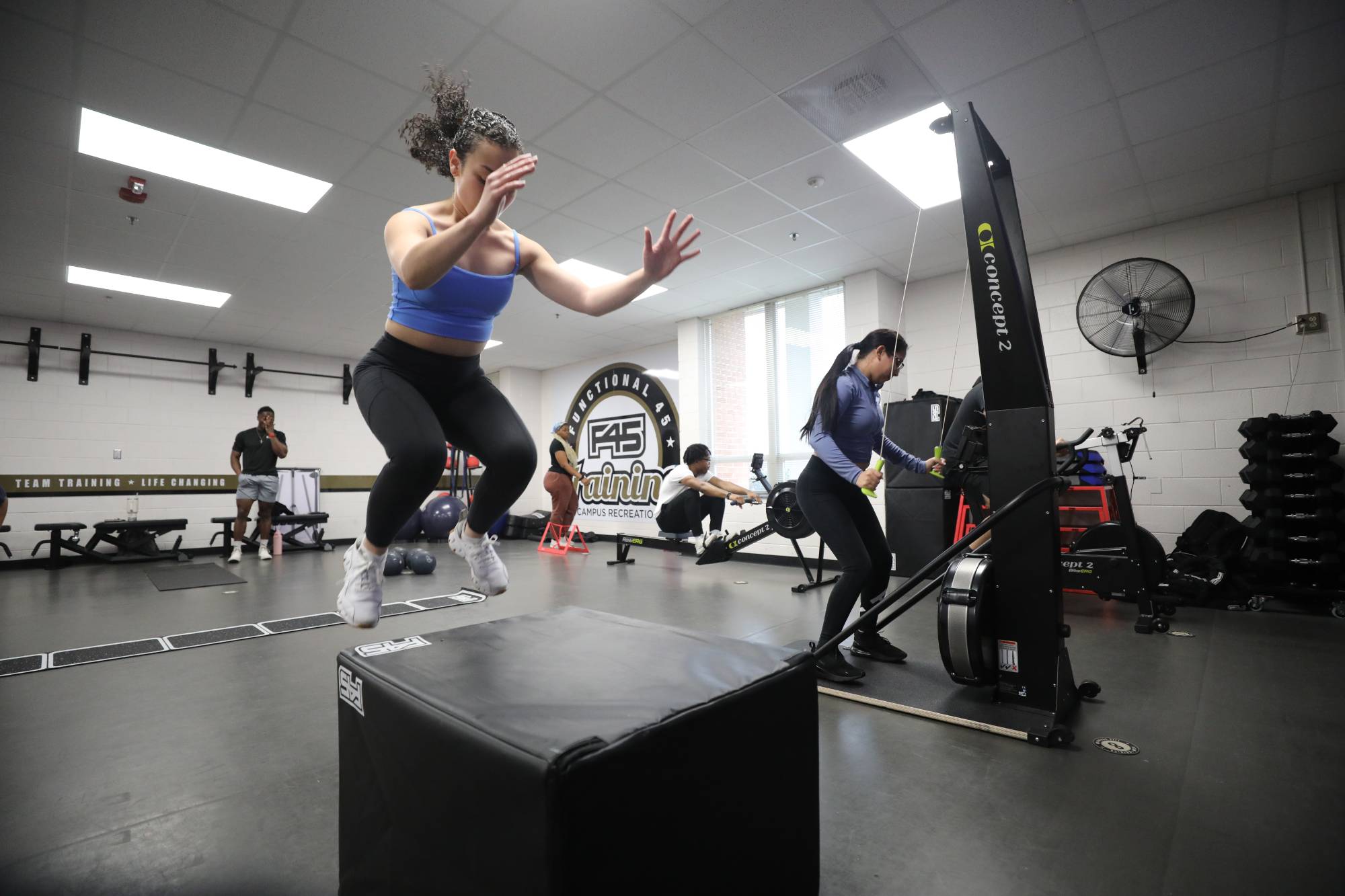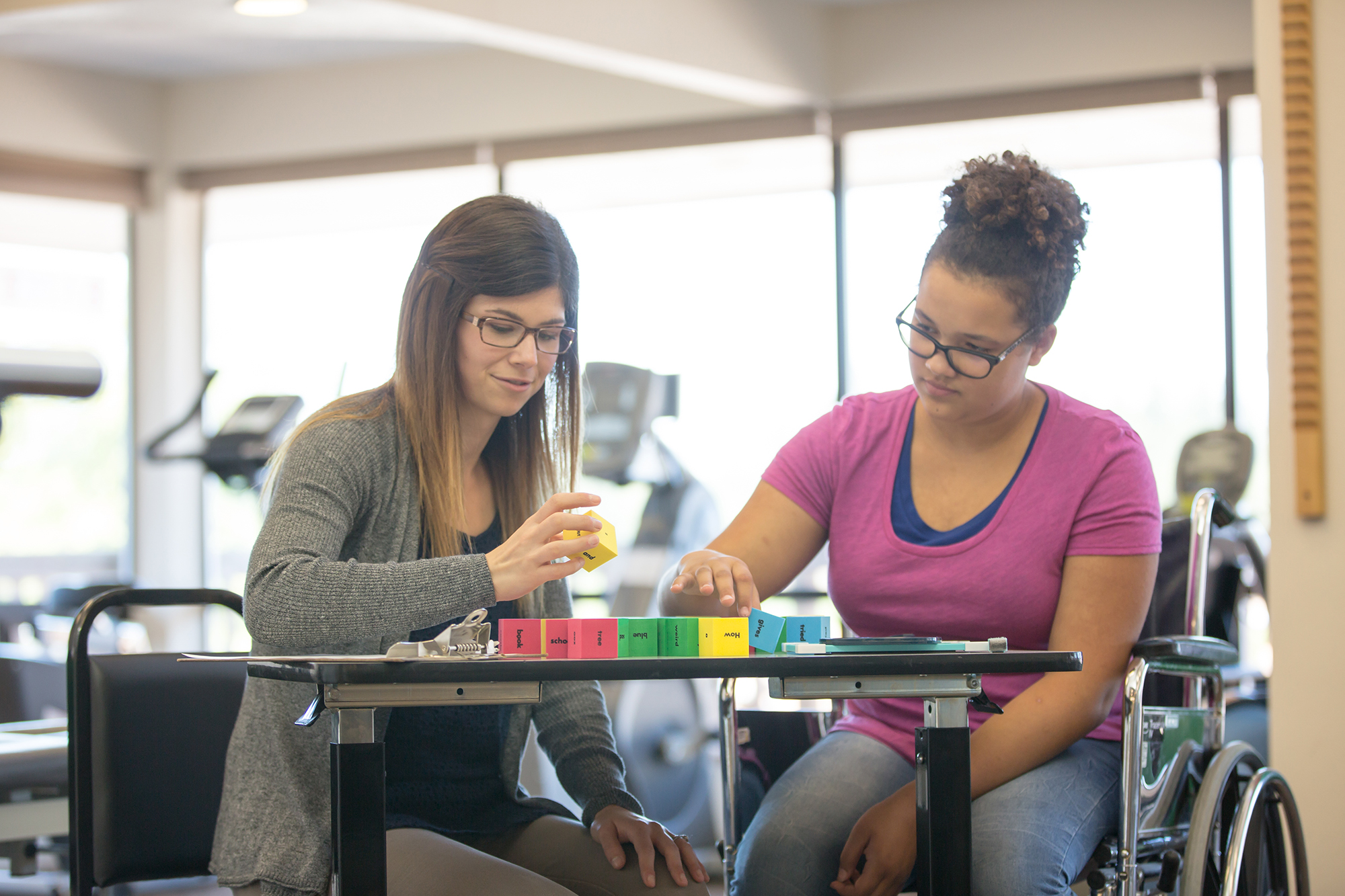
Occupational Therapy
Be ready for a career in occupational therapy in as little as 24 months. The Master of Science in Occupational Therapy (MSOT) program at UNC Pembroke blends classroom and hands-on learning. Engage in site visits, fieldwork placements and clinical simulations. With an occupational therapy degree from UNCP, you'll be ready to excel in this exciting and growing field.
| Semester | Application Deadline | Classes Start |
|---|---|---|
| Fall, '26 | Feb. 1, 2026 | Aug. 17, 2026 |
Enter a growing profession
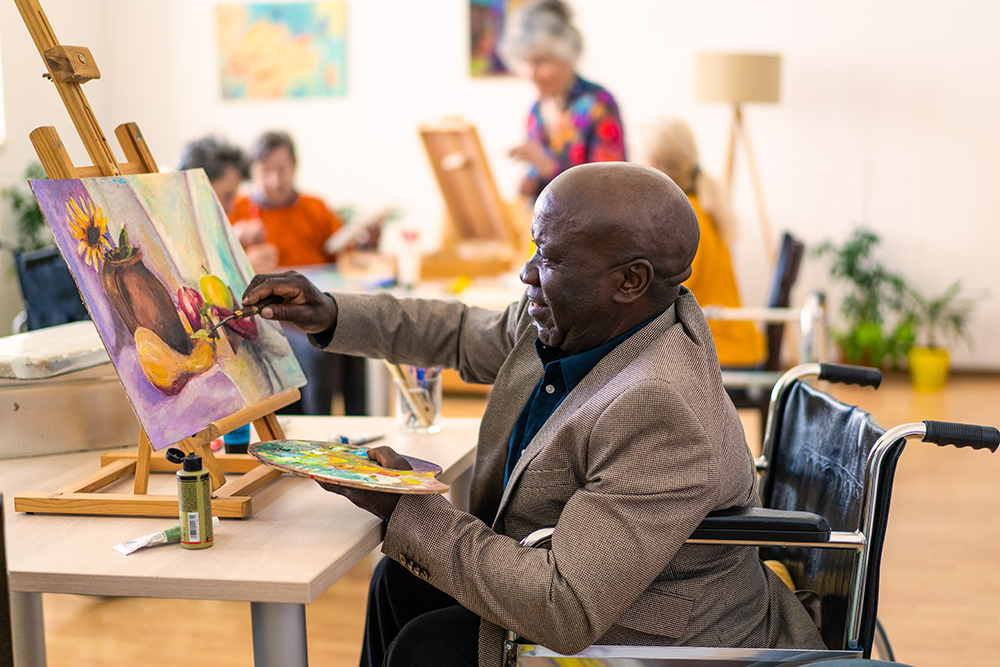
Best healthcare jobs by U.S. News & World Report
Expected Employment Growth

What Sets Our
Program Apart
"There’s a level of support in this program I’ve never had before as a student. It’s
not just reading from a book. It’s constantly hands-on, pushing us to apply what we’re
learning. When we graduate, we’ll be ready. Dr. Rafols truly cares about students,
not just in words but in how he leads. That kind of support trickles down, creating
an environment where you can grow and really thrive."
— Erika Nicholson, Occupational Therapy Student
Requirements & Resources
The Fall 2026 Cohort application deadline is March 15th.
Application details:
Please submit all application materials on OTCAS, otcas liaisoncas. OTCAS will take two-four weeks to verify the submitted application. The UNCP MSOT program will not review an application until it is in verified status. Your OTCAS application must be submitted and verified by the application deadline on March 15th.
- Complete the Occupational Therapist Centralized Application Service (OTCAS) Application
- Submit the web-based graduate application and fee through William Howard Dean Graduate School
- Official transcripts from all colleges and universities attended documenting successful completion of all prerequisite coursework.
- A current resume listing relevant experience.
- Cumulative GPA of at least 2.5 on a 4.0 scale from the most recent degree transcript.
- To meet the observation hour criteria, you have two choices:
- OTCAS Learning Activity (Required): Fulfill the requirement by engaging in the OTCAS learning activity in the UNC Pembroke portion of the application. This involves watching videos and responding to questions.
- Face-to-Face Observation (Optional): Document at least 20 hours of in-person observation, shadowing occupational therapy practitioners in various settings. This is optional and should be documented in your general OTCAS application.
Abnormal Psychology
Credit Hours: 3
Minimum Grade: B
Time Limit: Within 10 years prior to the date of enrollment
Notes: An abnormal psychology or a psychopathology course fulfills this requirement. If this prerequisite is taken on UNCP's campus the PSY 3600 Abnormal course fulfills this requirement.
Anatomy & Physiology (2 semesters, with lab)
Credit Hours: 8
Minimum Grade: C
Time Limit: Within six years of the date of enrollment
Notes: Human Anatomy and Physiology I and II or individual courses of Human Anatomy and Human Physiology with a lab in each.
Development Psychology
Credit Hours: 3
Minimum Grade: B
Time Limit: Within 10 years prior to the date of enrollment
Notes: Any lifespan development course that covers learning, motor, language, cognitive, emotional and social development meets this requirement. The course content must address the entire lifespan. If necessary, two different psychology courses can be taken to ensure this. If you take this prerequisite at UNCP, you will need PSY 2050 Childhood and Adolescence (3 credits) and PSY 3050 Psychology of Adult Development and Aging (3 credits) to fulfill the requirement.
Medical Terminology
Credit Hours: 2 or 3
Minimum Grade: B
Time Limit: Within six years of the date of enrollment
Statistics
Credit Hours: 3
Minimum Grade: B
Time Limit: Within 10 years prior to the date of enrollment
Notes: You may choose behavioral, educational, psychological, or mathematical statistics.
Recommended Coursework
Kinesiology coursework is suggested but not required.
The above admission requirements are intended for preliminary information purposes
and are subject to change upon final institutional approval.
These courses can be taken at UNCP or other accredited higher education institutions.
The chart below lists estimated annual expenses for full-time distance education Master of Science in Occupational Therapy graduate students living off campus:
| 2025-2026 | In-State | Out-of-State |
|---|---|---|
| Books & Supplies | $1,500.00 | $1,500.00 |
| Loan Fees | $132.00 | $132.00 |
| Personal/Miscellaneous | $6,924.00 | $6,924.00 |
| Housing | $7,638.00 | $7,638.00 |
| Meals | $9,489.00 | $9,489.00 |
| Tuition & Fees | $13,337.00 | $32,925.00 |
| Transportation | $3,291.00 | $3,291.00 |
| Total | $42,311.00 | $61,899.00 |
Cost includes Fall/Spring and Summer
Year One
| Semester | Course # | Course | Semester Hours |
|---|---|---|---|
| Fall | OCCT 5000 |
Theories and Foundations in Occupational Therapy |
3 |
| Fall | OCCT 5100 |
Functional Anatomy and Physiology |
4 |
| Fall | OCCT 5150 |
Clinical Kinesiology |
3 |
| Fall | OCCT 5300 |
Clinical Pathophysiology |
3 |
| Spring | OCCT 5400 |
Clinical Neuroscience |
3 |
| Spring | OCCT 5450 |
Pediatrics in Occupational Therapy I |
3 |
| Spring | OCCT 5475 |
Assessment In Adult Physical Dysfunction |
3 |
| Spring | OCCT 5200 |
Psychosocial Approaches and Mental Health |
3 |
| Spring | OCCT 5350 |
Clinical Decision Making I |
3 |
| Summer | OCCT 5680 |
Health Promotion and Aging |
3 |
| Summer | OCCT 5660 |
Assistive Technology |
3 |
| Summer | OCCT 5500 |
Research Methods |
3 |
| Summer | OCCT 5650 |
Management, Advocacy and Leadership |
3 |
| Summer | OCCT 6500 |
Professional Ethics in Clinical Practice |
2 |
Year Two
| Semester | Course # | Course | Semester Hours |
|---|---|---|---|
| Fall | OCCT 5005 |
Special Topics in Occupational Science |
2 |
| Fall | OCCT 6490 |
Pediatrics in Occupational Therapy II |
3 |
| Fall | OCCT 6480 |
Interventions in Adult Physical Dysfunction |
3 |
| Fall | OCCT 6000 |
Hand Therapy and Upper Extremity Disorders |
3 |
| Fall | OCCT 6351 |
Clinical Decision Making II |
3 |
| Spring | OCCT 6800 |
Senior Seminar 1 |
2 |
| Spring | OCCT 6850 |
Fieldwork Level II-a |
9 |
| Summer | OCCT 6880 |
Senior Seminar 2 |
2 |
| Summer | OCCT 6870 |
Fieldwork Level II-b |
9 |
Fieldwork is an essential part of your occupational therapy training. It gives you hands-on experience, supports professional development and helps you apply classroom knowledge in real settings. Under guidance from seasoned professionals, you'll gain practical skills, ethical insights and a strong foundation for a successful career.
Levels
Fieldwork is divided into two parts, Level I and Level II. Each offers unique benefits.
- Level I Fieldwork is completed in your 2nd and 4th semesters. It introduces you to various settings such as schools, clinics and community programs. Supervision may be provided by professionals like teachers, nurses or social workers. Typically, you'll work a half-day once or twice a week. You'll build familiarity and foundational skills in different environments. These placements are carefully chosen to fit your coursework and are usually within a 45-minute drive.
- Level II Fieldwork gives you in-depth experience in real-world occupational therapy. It prepares you for certification and practice. In your 5th and 6th semesters, you'll complete two 12-week, full-time placements — each in a different setting. You'll take on responsibilities like treatment planning, assessments and interprofessional collaboration. You'll gain more independence throughout the semesters. Placements are tailored to your interests. They are typically within an hour's drive.
Learn more about the importance of fieldwork through the Accreditation Council for Occupational Therapy Education (ACOTE).
Watch this virtual info session to learn more about what the Occupational Therapy program offers. The date and time of the session is March 5th @ 6PM
Info Session Recording
Password: 5BeyfMSb
View the MSOT handbook
Licenses & Certifications
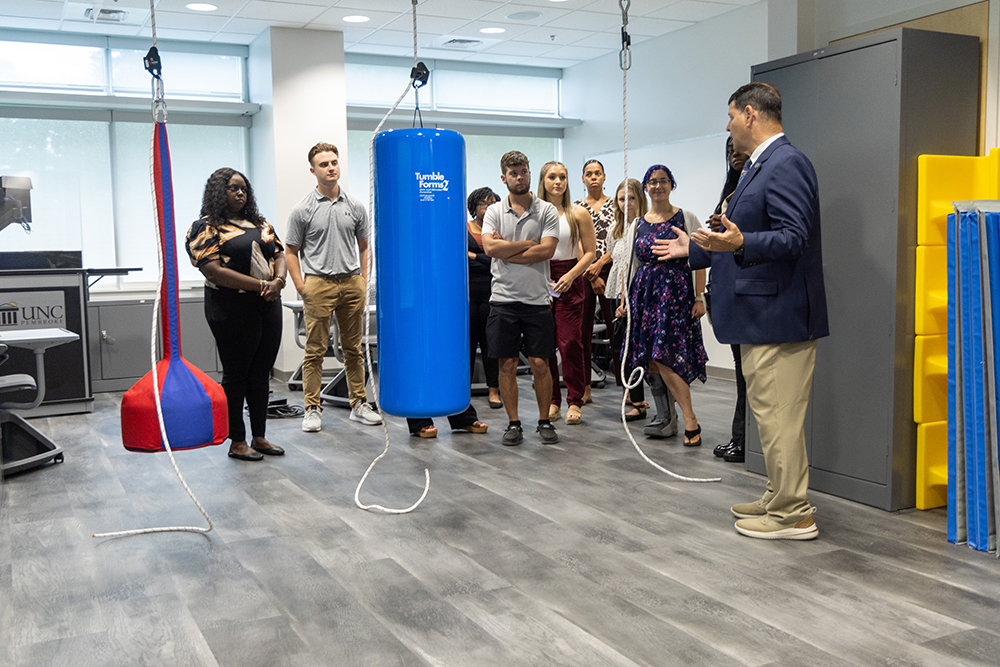
National Board for Certification in Occupational Therapy
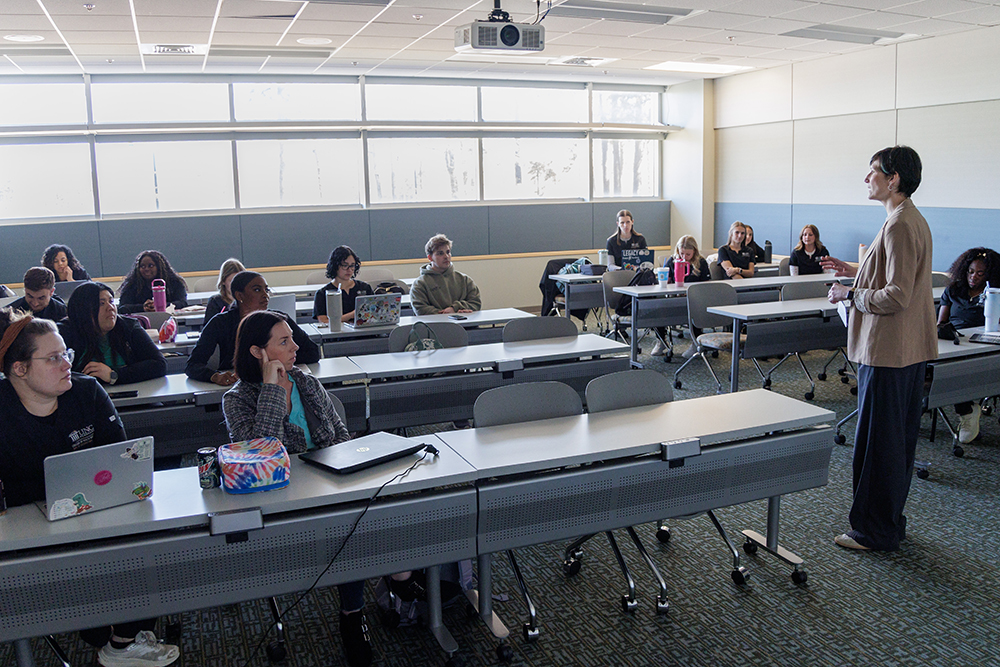
North Carolina Board of Occupational Therapy

Our
Guiding Principles
Our MSOT program is guided by core principles that shape every aspect of your learning experience — ensuring you graduate prepared, confident and ready to lead in the field of occupational therapy.

Core Principles
- Rooted in Community, Focused on the Future
Our program is built on the rich cultural heritage of our region, empowering students to become forward-thinking, culturally affirming leaders in healthcare. - Ethical, Critical, and Applied Learning
Critical thinking and ethical decision-making are woven throughout every course, reinforced through immersive, real-world learning experiences in local communities. - Expanding Access Through Inclusive Practice
Students and faculty work together in inclusive clinics that serve disadvantaged populations, building essential skills while making a tangible impact. - Training with the Latest Tools
You'll gain hands-on experience using advanced equipment and technologies that reflect today's evolving healthcare landscape. - Proven, Research-Based Instruction
Our teaching methods are grounded in evidence-based strategies designed to support deep understanding, skill mastery and long-term retention. - Board Certification Ready
With robust academic support and comprehensive preparation resources, our graduates are equipped to succeed on the national board certification exam. - Prepared to Lead with Confidence
You'll graduate not just with a degree — but with the professional skills, leadership mindset and clinical readiness to stand out and make a meaningful difference from day one.
Apply with Confidence

Admission Timeline
- Program Begins: Fall 2026
- Application window: Opens October 1, 2025 and closes March 15, 2026
- Decision Notifications: June 2026
- In-person orientation: July 24, 2026
- Background check and health clearance to be completed by September 30, 2026

Observation Hours

Background Checks
Have questions?
or call us at 910.521.6271
Send us a message and one of our counselors will get back to you
Clinical Assistant Professor of Occupational Therapy / Academic Fieldwork Coordinator Assistant Professor of Occupational TherapyOT Faculty



Brittany Reynolds
910.775.4009 


Pamela Kasyan-Howe
910.521.6000 Similar Programs
